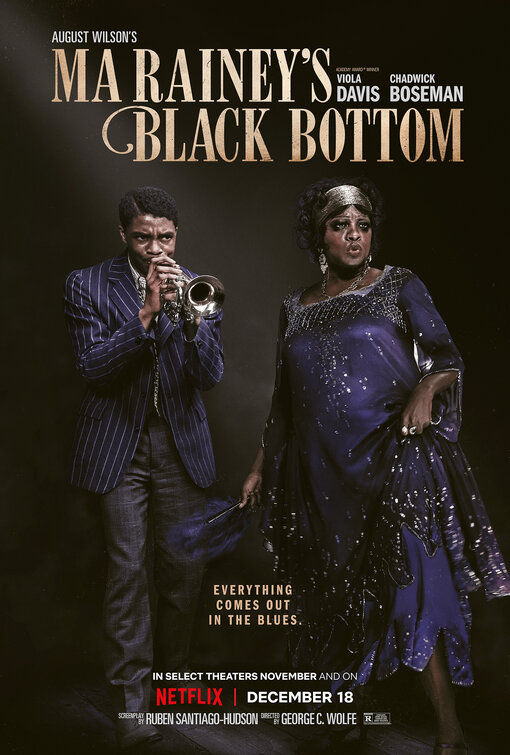
We get a taste of Ma Rainey’s immeasurable talent at a blues concert on stage right at the beginning. Our story concludes with a staid rendition of a song in a recording studio that has a much different energy. In between, there are a lot of lengthy speeches that serve to explain why. This is an actor’s showcase based on August Wilson’s 1982 play. Wilson is best known for a series of ten theatrical works collectively called The Pittsburgh Cycle that deal with themes of race and the African American experience. Adapted by Ruben Santiago-Hudson and directed by George C. Wolfe, this is the one piece of the cycle not set in Pittsburgh. It’s Chicago baby.
Viola Davis portrays the legendary “Mother of the Blues.” Ma Rainey was a trailblazing star in the 1920s. Readers may recall Viola Davis also appeared in Fences in 2016. That adaption of August Wilson’s play was shepherded by Denzel Washington who produced, directed and starred. He is a producer here and there are plans to bring all 10 of Wilson’s Pittsburgh Cycle to the screen under his guidance. It’s 1927 and Ma Rainey travels to Chicago to record a selection of her popular tunes. The play centers on a fictionalized recording session of one particular song which also serves as the title of this movie. Incidentally, the “Black Bottom” was a dance craze of the era. The chronicle touches upon a multitude of subjects that include race, religion, and music — specifically the exploitation of black artists at the hands of white producers.
The performances are spectacular. Ma Rainey is a bold presence — strong-willed, set in her ways. She is keenly aware that these white men need her. She has something of value: her voice. She withholds that talent like a negotiable commodity as they are constantly at odds. With makeup, weight, gold teeth, and impressive singing, she cuts an imposing figure. Veteran soul singer Maxayn Lewis provides the vocals. Viola Davis embodies the woman. She won an Oscar for Fences and she most certainly will garner a nomination for her extraordinary work here. Whenever Ma Rainey is up on the screen, the drama is at its most fascinating. She commands the room.
In a most poignant elegy, Chadwick Boseman gives his final performance. As trumpeter Levee, he’s brought in as a hired musician for Ma Rainey’s latest record. The two fiercely independent types butt heads. He would rather perform the tunes he has written with his own musical combo. To make matters even more constrained, he also has eyes for Ma Rainey’s girl Dussie Mae (Taylour Paige). Levee is the biggest part of the entire production and Boseman is getting the most accolades. He’s up on screen more than anyone, even Ma Rainey. Boseman is undeniably great and a likely Oscar nominee. However, actors Colman Domingo, Glynn Turman, and Michael Potts portray the other members in her backing band. Their contributions are worthy of note as well. The cast is a captivating ensemble.
The overall presentation beautifully captures the craft of the stage but it’s not cinematic. The production is stagey, and it unfolds in an extremely claustrophobic setting. Fences suffered from theatricality too. Its dialogue ultimately won the Pulitzer Prize though and the movie transcended that obstacle. Most of the “action” here takes place in a recording studio — and by action, I mean talking. Perhaps that confined feeling was desired, but it’s not pleasant. There’s a lot of monologuing going on here. Characters recount various stories. Most underscore how racism has affected their lives. Ma Rainey’s Black Bottom leans so heavily on amplified displays that it becomes a demonstration where actors act. We the audience are invited to marvel at their diction and technique. Those theatrics work perfectly well on Broadway, but it can be difficult to pull off in a film. Hamilton is a notable exception. Movies and plays are each elevated by distinct qualities. Great performances unite them both, but the rest doesn’t coalesce into a fully-realized whole. I was oddly unfulfilled by the end. Given that, I’d enjoy Ma Rainey’s Black Bottom a lot more on a theater stage than a TV screen.
12-18-20

2 Responses
I think this is overrated. Viola and Chadwick were very good, but the movie was just very talkie. No real excitement. 3 stars ⭐️
I do feel this is a strong contender for Best Actress and Best Actor. I admit they were good but it did feel more like an acting exercise than a compelling story.